- Home
- Stanley G. Weinbaum
The 27th Golden Age of Science Fiction Page 11
The 27th Golden Age of Science Fiction Read online
Page 11
“Oh, if you only can, Dr. Carl! If you only can!”
“We’ll see.” He patted her hand comfortingly.
“Now, you say the kind, gentle, and all that, phase is the normal one. Is that usually dominant?”
“Yes. Nick can master the other, or could until recently. He says this last—attack—is the worst he’s ever had; the other has been gaining strength.”
“Strange!” mused the Doctor. “Well,” he said with a smile of encouragement, “I’ll have a look at him.”
“Do you think you can help?” Pat asked anxiously. “Have you any idea what it is?”
“It isn’t a devil, at any rate,” he smiled.
“But have you any idea?”
“Naturally I have, but I can’t diagnose at second hand. I’ll have to talk to him.”
“But what do you think it is?” she persisted.
“I think it’s a fixation of an idea gained in childhood, Honey. I had a patient once—” He smiled at the reminiscence—“who had a fixed delusion of that sort. He was perfectly rational on every point save one—he believed that a pig with a pink ribbon was following him everywhere! Down town, into elevators and offices, home to bed—everywhere he went this pink-ribboned prize porker pursued him!”
“And did you cure him?”
“Well, he recovered,” said the Doctor non-committally. “We got rid of the pig. And it might be something of that nature that’s troubling your boy friend. Your description doesn’t sound like a praecox or a manic depressive, as I thought originally.”
“Oh,” said Pat abruptly. “I forgot. He went to a doctor in New York, a very great doctor.”
“Muenster?”
“He didn’t say whom. But this doctor studied him a long time, and finally came out with this fixed idea theory of yours. Only he couldn’t cure him.”
“Um.” Horker grunted thoughtfully.
“Do fixed ideas do things like that to people?” queried the girl. “Things like the pig and what happened to Nick?”
“They might.”
“Then they’re devils!” she announced with an air of finality. “They’re just your scientific jargon for exactly what Magda means when she says a person’s possessed by a devil. So I’m right anyway!”
“That’s good orthodox theology, Pat,” chuckled the Doctor. “We’ll try a little exorcism on your devil, then.” He rose to his feet. “Bring your boy friend around, will you?”
“Oh, Dr. Carl!” she cried. “He’s leaving! I’ll have to call him tonight!”
“Not tonight, Honey. Mueller would let me know if anything of that sort were happening. Tomorrow’s time enough.”
The girl stood erect, mounting to the top step to bring her head level with the Doctor’s. She threw her arms about him, burying her face in his massive shoulder.
“Dr. Carl,” she murmured, “I’m a nasty, ill-tempered, vicious little shrew, and I’m sorry, and I apologize. You know I’m crazy about you, and,” she whispered in his ear, “so’s Mother!”
CHAPTER 18
Vanished
“He doesn’t answer! I’m too late,” thought Pat disconsolately as she replaced the telephone. The cheerfulness with which she had awakened vanished like a patch of April sunshine. Now, with the failure of her third attempt in as many hours to communicate with Nicholas Devine, she was ready to confess defeat. She had waited too long. Despite Dr. Horker’s confidence in Mueller, she should have called last night—at once.
“He’s gone!” she murmured distractedly. She realized now the impossibility of finding him. His solitary habits, his dearth of friends, his lonely existence, left her without the least idea of how to commence a search. She knew, actually, so little about him—not even the source of the apparently sufficient income on which he subsisted. She felt herself completely at a loss, puzzled, lonesome, and disheartened. The futile buzzing of the telephone signal symbolized her frustration.
Perhaps, she thought, Dr. Horker might suggest something to do; perhaps, even, Mueller had reported Nick’s whereabouts. She seized the hope eagerly. A glance at her wrist-watch revealed the time as ten-thirty; squarely in the midst of the Doctor’s morning office hours, but no matter. If he were busy she could wait. She rose, bounding hastily down the stairs.
She glimpsed her mother opening mail in the library, and paused momentarily at the door. Mrs. Lane glanced up as she appeared.
“Hello,” said the mother. “You’ve been on the telephone all morning, and what did Carl want of you last night?”
“Argument,” responded Pat briefly.
“Carl’s a gem! He’s been of inestimable assistance in developing you into a very charming and clever daughter, and Heaven knows what I’d have raised without him!”
“Cain, probably,” suggested Pat. She passed into the hall and out the door, blinking in the brilliant August sunshine. She crossed the strip of turf, picked her way through the break in the hedge, and approached the Doctor’s door. It was open; it often was in summer time, especially during his brief office hours. She entered and went into the chamber used as waiting room.
His office door was closed; the faint hum of his voice sounded. She sat impatiently in a chair and forced herself to wait.
Fortunately, the delay was nominal; it was but a few minutes when the door opened and an opulent, middle-aged lady swept past her and away. Pat recognized her as Mrs. Lowry, some sort of cousin of the Brock pair.
“Good morning!” boomed the Doctor. “Professional call, I take it, since you’re here during office hours.” He settled his great form in a chair beside her.
“He’s gone!” said Pat plaintively. “I can’t reach him.”
“Humph!” grunted Horker helpfully.
“I’ve tried all morning—he’s always home in the morning.”
“Listen, you little scatter-brain!” rumbled the Doctor. “Why didn’t you tell me Mueller brought you home last night? I thought he was on the job.”
“I didn’t think of it,” she wailed. “Nick said he’d have to make some preparations, and I never dreamed he’d skip away like this.”
“He must have gone home directly after you left him, and skipped out immediately,” said the Doctor ruminatively. “Mueller never caught up with him.”
“But what’ll we do?” she cried desperately.
“He can’t have gone far with no more preparation than this,” soothed Horker. “He’ll write you in a day or two.”
“He won’t! He said he wouldn’t. He doesn’t want me to know where he is!” She was on the verge of tears.
“Now, now,” said the Doctor still in his soothing tones. “It isn’t as bad as all that.”
“Take off your bed-side manner!” she snapped, blinking to keep back the tears. “It’s worse! What ever can we do? Dr. Carl,” she changed to a pleading tone, “can’t you think of something?”
“Of course, Pat! I can think of several things to do if you’ll quiet down for a moment or so.”
“I’m sorry, Dr. Carl—but what can we do?”
“First, perhaps Mueller can trace him. That’s his business, you know.”
“But suppose he can’t—what then?”
“Well, I’d suggest you write him a letter.”
“But I don’t know where to write!” she wailed. “I don’t know his address!”
“Be still a moment, scatter-brain! Address it to his last residence; you know that, don’t you? Of course you do. Now, don’t you suppose he’ll leave a forwarding address? He must receive some sort of mail about his income, or estate, or whatever he lives on. Your letter’ll find him, Honey; don’t you doubt it.”
“Oh, do you think so?” she asked, suddenly hopeful. “Do you really think so?”
“I really think so. You would too if you didn’t fly into a panic every time some little difficulty c
onfronts you. Sometimes even my psychiatry is puzzled to explain how you can be so clever and so stupid, so self-reliant and so dependent, so capable and so helpless—all at one and the same time. Your Nick can’t be as much of a paradox as you are!”
“I wonder if a letter will reach him,” she said eagerly, ignoring the Doctor’s remarks. “I’ll try. I’ll try immediately.”
“I sort of had a feeling you would,” said Horker amiably. “I hope you succeed; and not only for your sake, Pat, because God knows how this thing will work out. But I’m anxious to examine this youngster of yours on my own account; he must be a remarkable specimen to account for all the perturbation he’s managed to cause you. And this Jekyll-and-Hyde angle sounds interesting, too.”
“Jekyll and Hyde!” echoed Pat. “Dr. Carl, is that possible?”
“Not literally,” chuckled the other, “though in a sense, Stevenson anticipated Freud in his thesis that liberating the evil serves also to release the good.”
“But—It was a drug that caused that change in the story, wasn’t it?”
“Well? Do you suspect your friend of being addicted to some mysterious drug? Is that the latest hypothesis?”
“Is there such a drug? One that could change a person’s character?”
“All alkaloids do that, Honey. Some of them stimulate, some depress, some breed frenzies, and some give visions of delight—but all of them influence one’s mental and emotional organization, which you call character. So for that matter, does a square meal, or a cup of coffee, or even a rainy day.”
“But isn’t there a drug that can separate good qualities from evil, like the story?”
“Emphatically not, Pat! That’s not the trouble with this pesky boy friend of yours.”
“Well,” said the girl doubtfully, “I only wish I had as much faith in your psychologies as you have. If you brain-doctors know it all, why do you switch theories every year?”
“We don’t know it all. On the other hand, there are a few things to be said in our favor.”
“What are they?”
“For one,” replied the Doctor, “we do cure people occasionally. You’ll admit that.”
“Sure,” said Pat. “So did the Salem witches—occasionally.” She gave him a suddenly worried look. “Oh, Dr. Carl, don’t think I’m not grateful! You know how much I’m hoping from your help, but I’m miserably anxious over all this.”
“Never mind, Honey. You’re not the first one to point out the shortcomings of the medical profession. That’s a game played by plenty of physicians too.” He paused at the sound of footsteps on the porch, followed by the buzz of the doorbell. “Run along and write your letter, dear—here comes that Tuesday hypochondriac of mine, and he’s rich enough for my careful attention.”
Pat flashed him a quick smile of farewell and slipped quietly into the hall. At the door she passed the Doctor’s patient—a lean, elderly gentleman of woe-begone visage—and returned to her own home.
Her spirits, mercurial to a degree, had risen again. She was suddenly positive that the Doctor’s scheme would bring results, and she darted into the house almost buoyantly. Her mother had abandoned the desk, and she ensconced herself before it, finding paper and pen, and staring thoughtfully at the blank sheet.
Finally she wrote.
Dear Nick—
Something has happened, favorable, I think, to us. I believe I have found the help we need.
Will you come if you can, or if that’s not possible, break that self-given promise of yours, and communicate with me?
I love you.
She signed it simply “Pat”, placed it in an envelope, addressed it hastily, and hurried out to post it. On her return she spied the Doctor’s hypochondriac in the act of leaving. He walked past her with his lean, worry-smitten face like a study of Hogarth, and she heard him mumbling to himself. The elation went out of her; she mounted the steps very soberly, and went miserably inside.
CHAPTER 19
Man or Monster?
Pat suffered Wednesday through somehow, knowing that any such early response to her letter was impossible. Still, that impossibility did not deter her from starting at the sound of the telephone, and sorting through the mail with an eagerness that drew a casual attention from her mother.
“Good Heavens, Patricia! You’re like a child watching for an answer to his note to Santa Claus!”
“That’s what I am, I guess,” responded the girl ruefully. “Maybe I expect too much from Santa Claus.”
Late in the afternoon she drifted over to Dr. Horker’s residence, to be informed that he was out. For distraction, she went in anyway, and spent a while browsing among the books in the library. She blundered into Kraft-Ebing, and read a few pages in growing indignation.
“I’m ashamed to be human!” she muttered disgustedly to herself, slamming shut the Psychopathia Sexualis. “I wouldn’t be a doctor, or have a child of mine become one, if I were positively certain he’d turn into Lord Lister himself! Nick was right when he said doctors live on people’s troubles.”
She wondered how Dr. Horker could remain so human, so kindly and understanding, when as he said himself his world was a parade of misfits, incompetents, and all the nastiness of mortals. He was nice; she felt no embarrassment in confiding in him even when she might hesitate to bare her feelings to her own mother. Or was it simply the natural thing to do to tell one’s troubles to a doctor?
Not, of course, that the situation reflected any discredit on her mother. Mrs. Lane was a very precious sort of parent, she mused, young as Pat in spirit, appreciative and enthusiastically fond of her daughter. That she trusted Pat, that she permitted her to do entirely as she pleased, was exactly as the girl would have it; it argued no lack of affection that each of them had their separate interests, and if the girl occasionally found herself in unpleasantness such as this, that too was her own fault.
And yet, she reflected, it was a bitter thing to have no one to whom to turn. If it weren’t for Dr. Carl and his jovial willingness to commit any sin up to malpractice to help her, she might have felt differently. But there always was Dr. Carl, and that, she concluded, was that.
She wandered back to her own side of the hedge, missing for the first time in many weeks the companionship of the old crowd. There hadn’t been many idle afternoons heretofore during the summer; there’d always been some of the collegiate vacationing in town, and Pat had never needed other lure than her own piquant vivacity to assure herself of ample attention. Now, of course, it was different; she had so definitely tagged herself with the same Nicholas Devine that even the most ardent of the group had taken the warning.
“And I don’t regret it either!” she told herself as she entered the house. “Trouble, mystery, suffering and all—I don’t regret it! I’ve had my compensations too.”
She sighed and trudged upstairs to prepare for dinner.
* * * *
Morning found Pat in a fair frenzy of trepidation. She kept repeating to herself that two days wasn’t enough, that more time might be required, that even had Nicholas Devine received her letter, he might not have answered at once. Yet she was quivering as she darted into the hall to examine the mail.
It was there! She spied a fragment of the irregular handwriting and seized the envelope from beneath a clutter of notes, bills, and advertisements. She glanced at the post-mark. Chicago! He hadn’t left the city, trusting perhaps to the anonymity conferred by its colossal swarm of humanity. Indeed, she thought as she stared at the missive, he might have moved around the corner, and save for the chance of a fortuitous meeting she’d never know it.
She tore open the envelope and scanned the several scrawled lines.
No heading, no salutation, not even a signature. Just, “Thursday evening at our place in the park.” No more; she studied the few words intently, as if she could read into their bald phrasing the moods
and hidden emotions of the writer.
A single phrase, but sufficient. The day was suddenly brighter, and the hope which had glowed so dimly yesterday was abruptly almost more than a hope—a certainty. All her doubts of Dr. Horker’s abilities were forgotten; already the solution of this uncanny mystery seemed assured, and the restoration of romance imminent. She carried the letter to her own room and tucked it carefully by the other in the drawer of the night-table.
Thursday evening—this evening! Many hours intervened between now and a reasonable time for the meeting, but they loomed no longer drab, dull, and hopeless. She lay on her bed and dreamed.
She could meet Nick as early as possible; perhaps at eight-thirty, and bring him directly to the Doctor’s residence. No use wasting a moment, she mused; the sooner some light could be thrown on the affliction, the sooner they could lay the devil—exorcise it. Demon, fixed idea, mental aberration, or whatever Dr. Carl chose to call it, it had to be met and vanquished once and forever. And it could be vanquished; in her present mood she didn’t doubt it. Then—after that—there was the prospect of her own Nick regained, and the sweet vistas opened by that reflection.
She lunched in an abstracted manner. In the afternoon, when the phone rang, she jumped in a startled manner, then relaxed with a shrug.
But this time it was for her. She darted into the hall to take the call on the lower phone; she was hardly surprised but thoroughly excited to recognize the voice of Nicholas Devine.
“Pat?”
“Nick! Oh, Nick, Honey! What is it?”
“My note to you.” Even across the wire she sensed the strain in his tense tones. “You’ve read it?”
“Of course, Nick! I’ll be there.”
“No.” His voice was trembling. “You won’t come, Pat. Promise you won’t!”
“But why? Why not, Nick? Oh, it’s terribly important that I see you!”
“You’re not to come, Pat!”
“But—” An idea was struggling to her consciousness. “Nick, was it—?”
“Yes. You know now.”
“But, Honey, what difference does it make? You come. You must, Nick!”

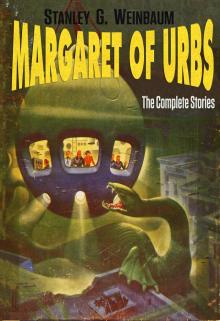 The Complete Margaret of Urbs
The Complete Margaret of Urbs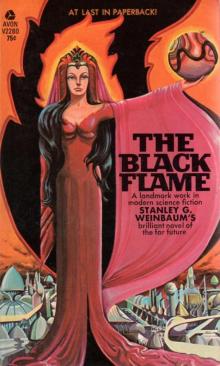 The Black Flame
The Black Flame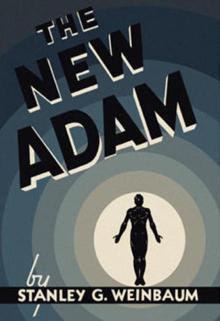 The New Adam
The New Adam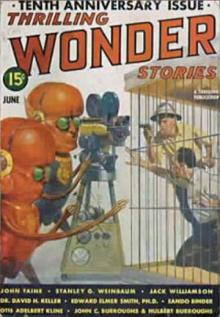 Dawn of Flame
Dawn of Flame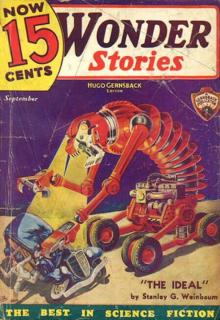 The Ideal
The Ideal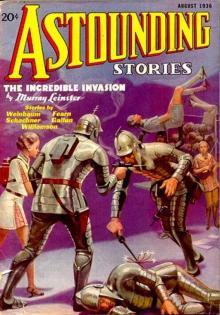 Proteus Island
Proteus Island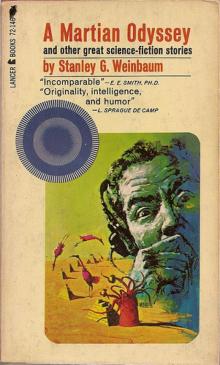 The Worlds of If
The Worlds of If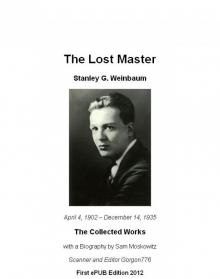 The Lost Master - The Collected Works
The Lost Master - The Collected Works The 27th Golden Age of Science Fiction
The 27th Golden Age of Science Fiction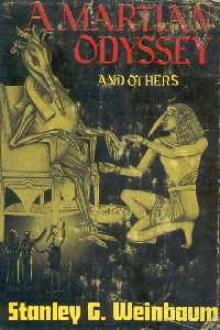 A Martian Odyssey
A Martian Odyssey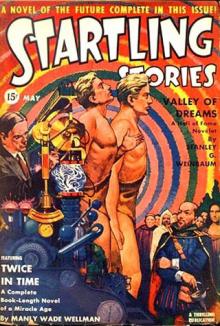 Valley of Dreams
Valley of Dreams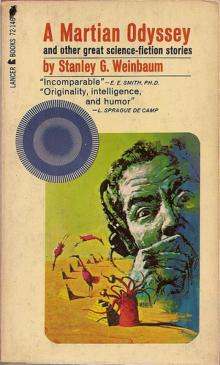 The Point of View
The Point of View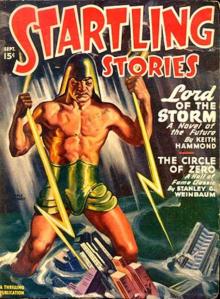 The Circle of Zero
The Circle of Zero